Dave Weiner: "Steve Vai was always the bar as far as quality and what I should be doing"
The PRS player recounts a 20-year history as Vai's touring guitarist, and shares the lowdown on his upcoming projects
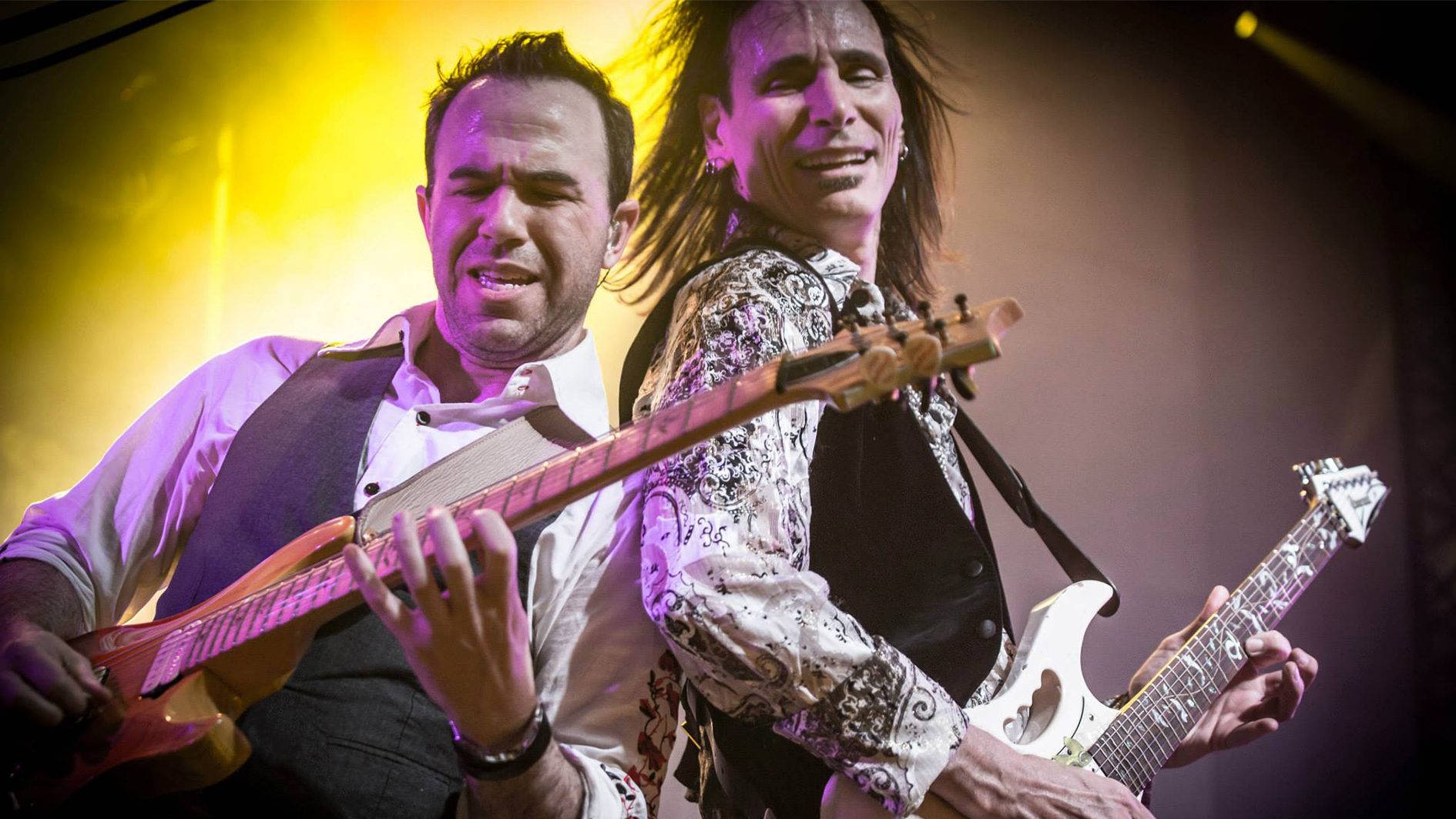
20 years ago, in late October 1999, Dave Weiner was hired on as a member of Steve Vai’s band. Thousands of miles and memories later, their partnership remains strong. Because of that path, and perhaps as part of it, Weiner has established himself as a guitar force in his own right.
A graduate of the Guitar Institute of Technology, he is a master clinician and instructor. He has recorded solo albums, with another in the works. He has a subscription-tier instructional/educational site, Guitopia, performs with the trio Visible At Night, an improve-style group with whom he plans to release music in 2020, and last year he introduced his new band, Monument Shine. Their first single, Here I Am, debuted in October and is available across all streaming platforms.
Weiner began playing guitar when he was 10 years old, and was writing songs soon after. “It was just an innate thing,” he says. “Of course, when you’re 10, as far as quality... still, it was an effort toward art and creativity, and on a daily basis.”
By age 13, he had assembled an original rock band and recorded his first full-length album with them in a professional studio. A second album followed two years later. As a college student, he played in a cover band, and while he never envisioned entering the world of instrumental music, his trajectory changed when he became a part of Vai’s team.
When Vai took a break from the road in early 2000, Weiner continued on his instrumental path as a solo artist during his off time. It was partly a natural continuation of the career he had built for himself, and partly because, in his words, “Good, professional, high-quality singers are hard to find, and when you do find them, they’re so busy that it’s hard to wrangle one into a band.”
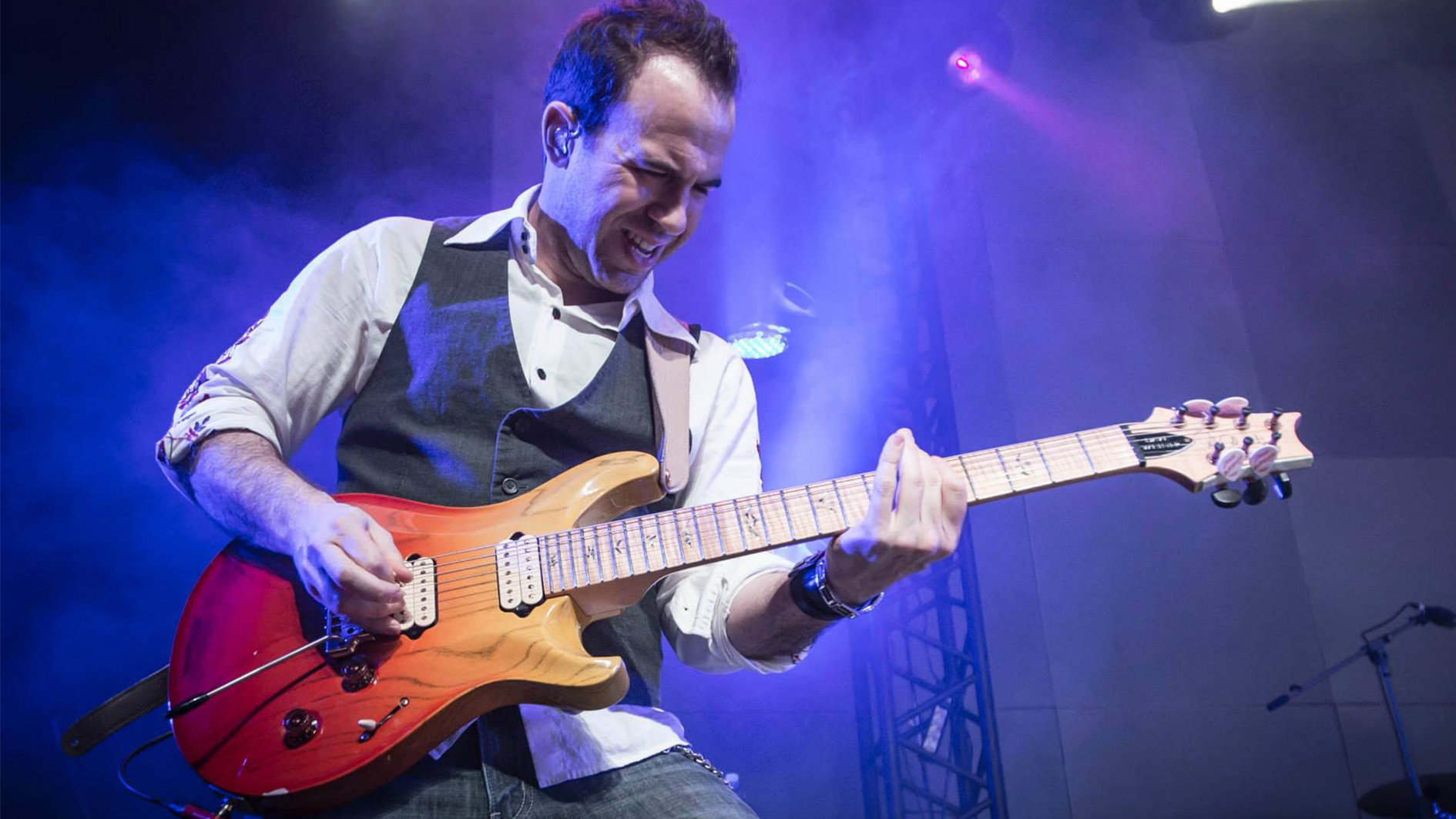
Which brings him back to Monument Shine. Weiner found himself in a place and time that allowed him to return to his roots: playing in a rock band. “I learned a lot from starting the band, writing songs and gigging them, and releasing the single and video,” he says.
“From there, I’ve been processing where I want it to go music-wise. The music we did leaned a bit more toward blues-rock, which is awesome, but I've been writing new material, which will be out this year, that is a bit more centered.”
Get The Pick Newsletter
All the latest guitar news, interviews, lessons, reviews, deals and more, direct to your inbox!
What is the story behind Monument Shine?
"As you said, it was really the roots of where I started, of my enjoyment, of what I wanted to play. And it came together fairly quickly. I started writing in March of 2019. I wrote five originals, put together a band, and we started rehearsing around late June for a gig that was booked in late August.
"The premise of the band is fun, easy to play, easy to listen to, music. That doesn’t mean it doesn’t have clever little twists in the songs, of course. But the goal for me, with this music, is to have it be easily accessible while serving my purpose as an artist, my level of playing.
"It’s got a certain standard that it has to live up to, but the broad-stroke goal is to have as many ears as possible on it, and for them to be able to easily sink their teeth into it, musicians or not."
How do you approach songwriting for this project? It’s obviously a different world from your solo albums.
Sitting there for hours trying to pick out the perfect chord for one section does not bring me joy. What brings me joy is getting this stuff done and going out and playing it
"In my previous work I labored over a lot of stuff, and I’m going to blame Steve for that! I’m going to blame Vai, because over the 20 years of working with him, he is so dedicated and the hardest worker I’ve ever seen.
"He has a strong awareness of little details, and when you work closely with someone like that for two decades, you really get to know their work ethic and it is an inspiration. You want to try to live up to that. So he was always the bar as far as quality and what I should be doing.
"My instrumental records, except for the acoustic one, A Collection of Short Stories: Vol. 1., the ones before that, On Revolute and Shove the Sun Aside, maybe I didn’t know better, but I labored over way too many fine details.
"So when it came time to write this music, one of the things I’m doing is just trying to plow through it. That doesn’t mean I’m not giving it the attention to details. It just means I don’t need to labor over so many fine details.
"Sitting there for hours trying to pick out the perfect chord for one section does not bring me joy. What brings me joy is getting this stuff done and going out and playing it. So if it sounds good, if it works for the part, I do one take and I leave it and that’s it. Maybe I have to tweak it later, but I have learned to trust my instincts and get stuff done much faster."
According to your website, you’re working on another acoustic album. Is that still a work in progress?
"I’ve been talking about A Collection of Short Stories: Vol. 2 for years. Vol. 1 came out in 2012, and the next day I was on tour with Steve. We were on tour into 2016 and 2017 very consistently. I did get the chance to open the shows in Europe, playing some of my acoustic music, getting great reviews, and I was very happy about that. It was really fun to do.
"But yes, a second version of that is coming. I’ve got ten songs more than well into production, but the priority was this band, and there’s only so much time in the day, so I put time into that. I want to carve out some time to keep moving with Short Stories, because I would like to get that out in early 2020.
"Then there’s Visible At Night. We’ve been together forever, and it was always a for-fun, very casual kind of thing, but we need to release something this year. I’ve also been talking about a new electric solo record that I’ve been labeling as Dave Weiner and Friends, where it’s going to be ten songs and I’ll invite friends to play on it, high-profile players, and that will be a lot of fun. But above all, getting Monument Shine out and gigging is the priority."
You’re a longtime PRS artist. Which models are you currently using?
"I joined PRS in 2009, and it was the perfect gear to take out on Vai tours, and they are the perfect people still to this day. Throughout the entire organization, they’re all awesome and continuously supportive.
"Monument Shine’s music is a Strat kind of sound. I’ve got a couple of Fender Strats, I’ve got a Bill Nash Strat, which is a fantastic guitar, and I still have my PRS DC9, which was their version of a Strat years ago. They’ve had various versions of a Strat, but none of them ever did what a Strat did.
"So I’m writing this music, and here comes the Silver Sky, the collaboration with John Mayer, which is a bona fide Strat-type guitar. They took John Mayer’s ’63 Strat and Paul Reed Smith’s ’64 Strat, and they put the best of both of them into this guitar. That’s what I’ve been using mostly, and it is fantastic.
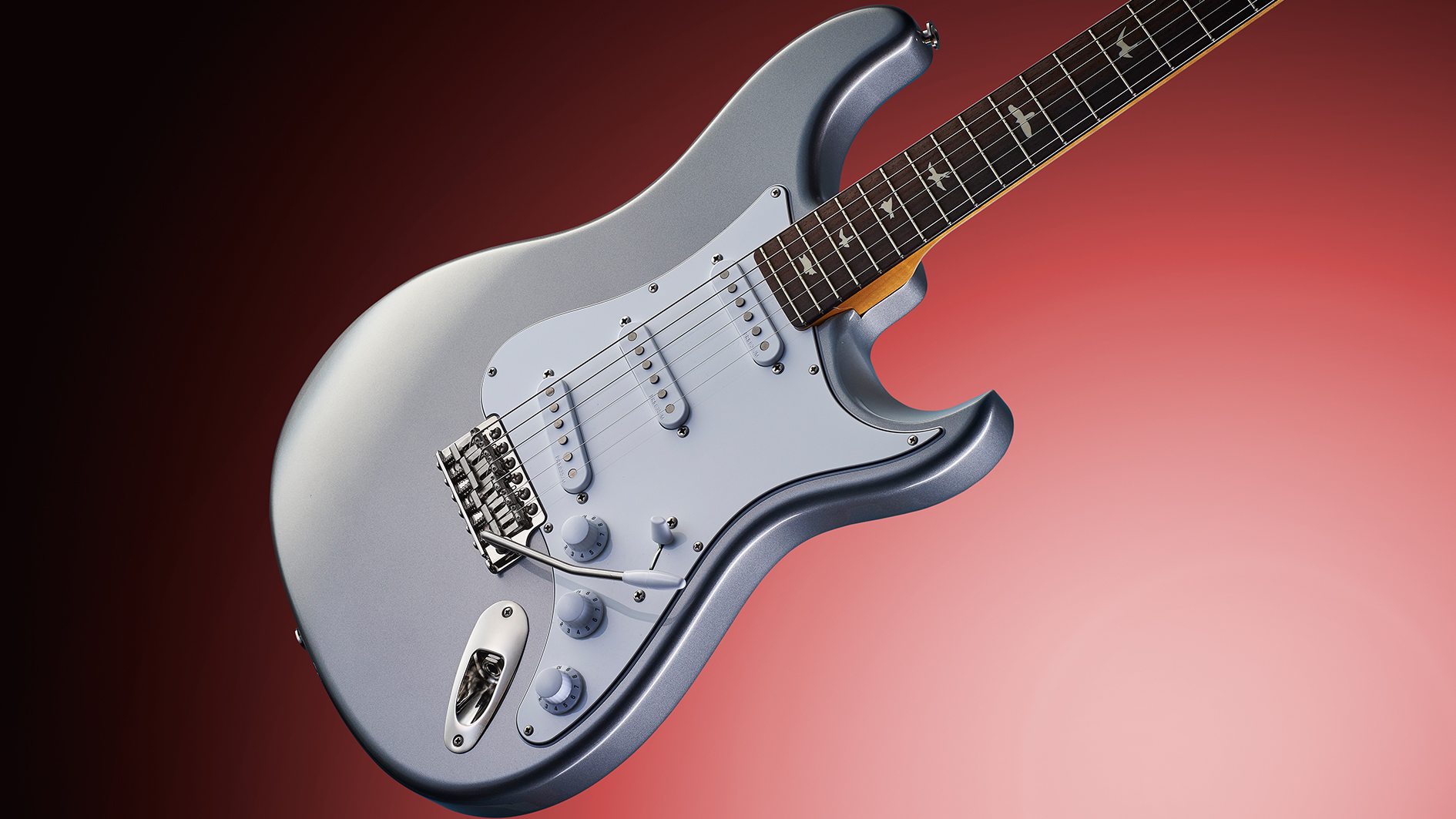
"I’m playing through Friedman Amplification’s Smallbox 50s. I run in stereo, so I’m always using two of them. They’re it. They are the amp. I play my touring rig at home, and I play two amps through two Friedman 4x12’s.
"They sound very quiet, but they still sound great. They sound even better loud, of course, but they’re amazing at home. The 412 cabs each have a pair of Celestion Vintage 30s and Celestion Greenbacks, which is a fantastic mixture. And that’s my sound.
"I have very few pedals because that amp is so awesome that it has weaned me off of pedals. I still use my go-to overdrive, which was built for me a long time ago. I use that just to push the amp a little bit. I’m using an old Klon Centaur, which is a great pedal with a very unique sound, a Strymon Volante for reverb and delay, and that’s really it. I try to keep the signal path as clean as possible.
"Acoustically, I’m still playing a PRS Angelus for recording. On tour I took the Angelus SE. Fantastic quality, they sound amazing, and they’re extremely roadworthy. That’s what I took out on the Vai tour when I was opening for Steve."
What makes PRS right for those tours?
"I needed guitars that could take a beating, because I duplicate a lot of lines with Steve and a lot of whammy bar stuff. It’s a heavy touring show, meaning we play at least six nights a week and the show is two-and-a-half hours, so those guitars have to be extremely roadworthy.
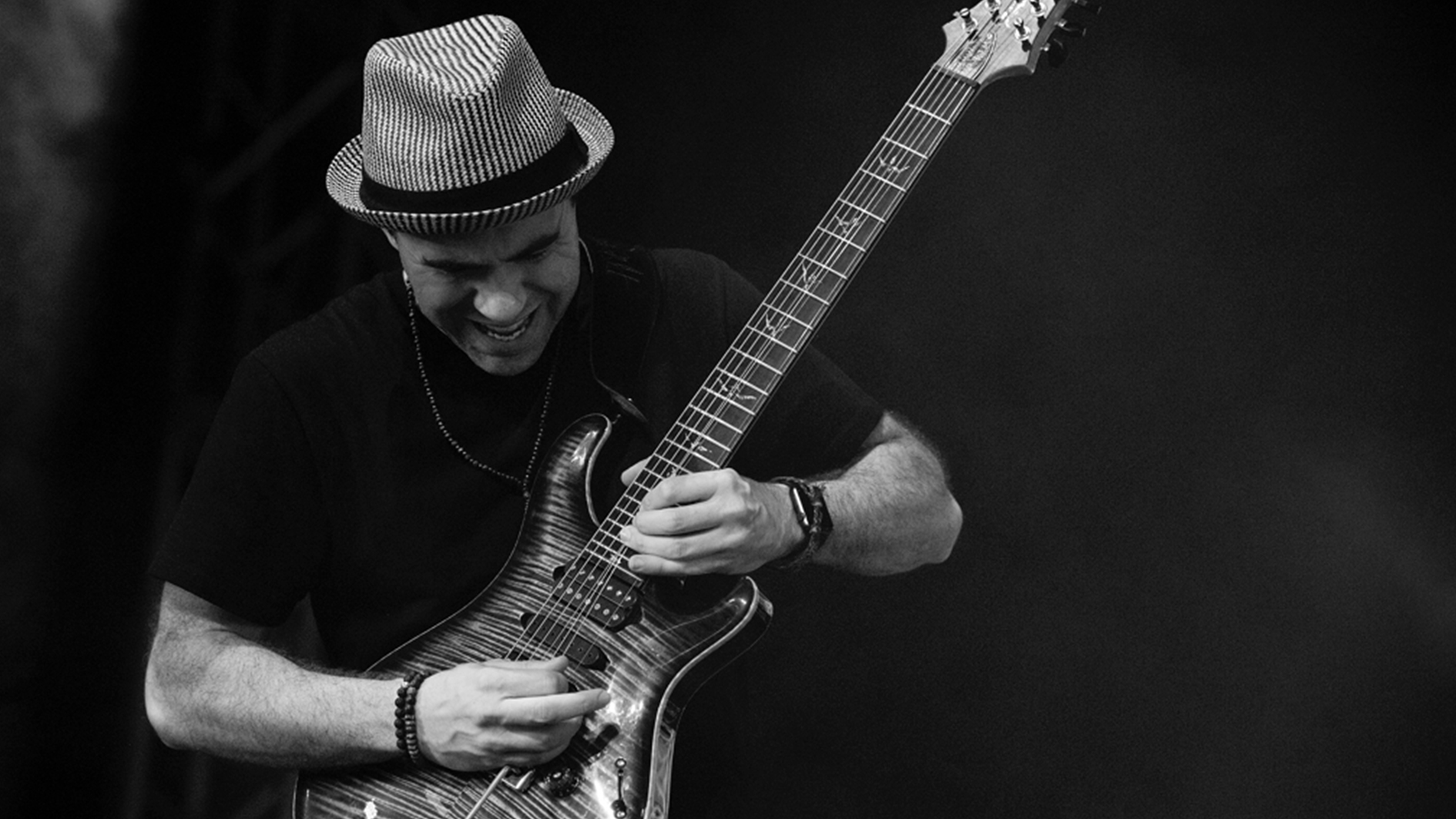
"I also need a bridge system that can take a beating like that without the hassle of a locking system. I’m not a fan of them because they’re more work than needs to be done. If you have a guitar that doesn’t have a locking system, but it’s well set up and well built, it’s still going to be able to do everything you need to do, and PRS certainly serves that.
"With Steve, I need seven strings, I need 24 frets, and PRS was kind enough to build me a couple of customs in 2009/2010. We did another one in 2016/2017. They’re very roadworthy, they stay in tune, they’re gorgeous, the build quality is always on par - they just tick all the boxes for what I need to do with Steve."
As a clinician and private instructor, in addition to overseeing and creating content on Guitopia, what effect does the Internet have on guitar students? Has it changed their expectations? Do you see errors in technique and execution because of YouTube videos they watch and emulate?
There’s a lot of fantastic information out there, but there’s also a lot of misinformation, and there’s blatantly wrong information. There’s misguidance, which needs correcting
"Oh, absolutely. I do teach privately, I do some Skype lessons, but it’s very limited, again just because of time. But nearly every single one says, 'Well, I supplement my learning with YouTube videos, and this person said this.'
"There’s a lot of fantastic information out there, but there’s also a lot of misinformation, and there’s blatantly wrong information. There’s misguidance, which needs correcting. Every time it’s brought to my attention, I look at the video, and it’s from people who don’t have experience but are calling themselves teachers.
"If you don’t have experience, what are you teaching? You’re regurgitating what you learned, but you didn’t make it your own to figure out exactly the best way to execute it, think about it, and therefore teach it.
"So those things have to be addressed, and I can see the light bulbs go off as soon as I succinctly say, 'No, it’s this,' and explain it as clearly as possible, in a casual and straightforward way.
"That’s how I want to be taught, and that takes going through the evolution and refinement of concepts and usage in order to be able to instruct. That’s not something you get from posting a video on YouTube. That’s something that takes years and years of experience."
You’ve reached the 20-year milestone with Vai. When you look at that timeline - and recently he has posted a lot of anniversary events on his Facebook page - what are your thoughts?
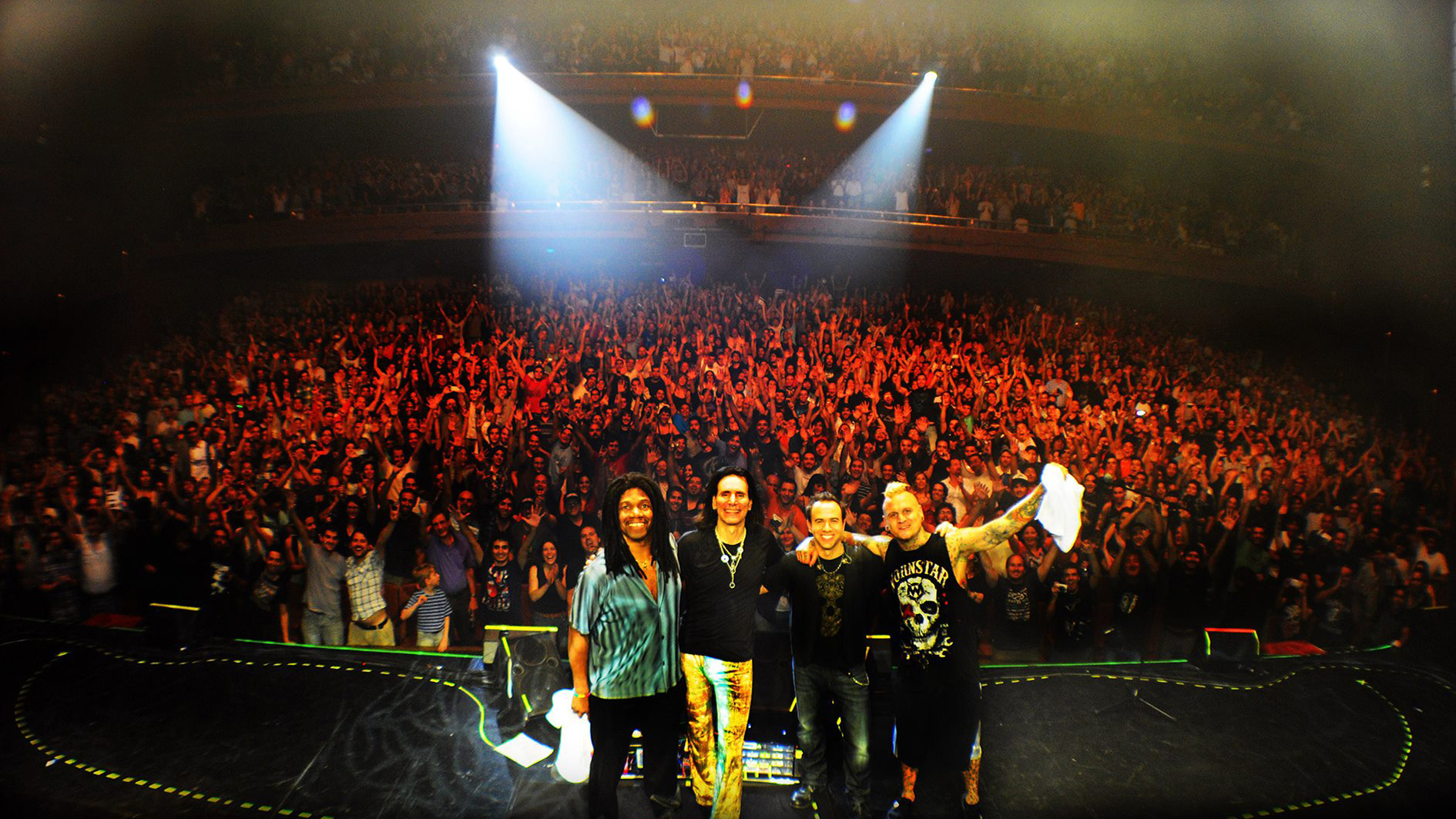
"It’s always cool to reflect on the stuff that has happened. But honestly, I don’t look backward. I don’t think about the past much. I don’t live in the past at all. I’m always trying to focus on the present moment. I’m not too concerned about the future.
"I keep a plan in mind for what I want to achieve, but people who live in the past or the future don’t get anything done today. So I don’t put too much thought into those kinds of things. It’s a nice moment of reflection, but it’s always about where am I now and where are we going. That’s it."
Alison Richter is a seasoned journalist who interviews musicians, producers, engineers, and other industry professionals, and covers mental health issues for GuitarWorld.com. Writing credits include a wide range of publications, including GuitarWorld.com, MusicRadar.com, Bass Player, TNAG Connoisseur, Reverb, Music Industry News, Acoustic, Drummer, Guitar.com, Gearphoria, She Shreds, Guitar Girl, and Collectible Guitar.
“A virtuoso beyond virtuosos”: Matteo Mancuso has become one of the hottest guitar talents on the planet – now he’s finally announced his first headline US tour
“His songs are timeless, you can’t tell if they were written in the 1400s or now”: Michael Hurley, guitarist and singer/songwriter known as the ‘Godfather of freak folk,’ dies at 83









